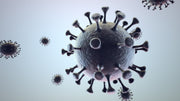The Science of CBD: How CBD Works Within the Human Body

The Science of CBD: How CBD Works Within the Human Body
If you’re familiar with CBD (cannabidiol) products, you may have seen articles or lists demonstrating the incredibly diverse range of health benefits that it’s alleged to provide. This may leave you wondering: how could a single compound offer so many diverse, seemingly unrelated benefits for body and mind? How does CBD work, and what function does it perform within the human body? In this article, we address these questions and more, explaining everything you need to know about the science of CBD and its interaction with the human body.
The Endocannabinoid System
CBD produces its effects through its interaction with the endocannabinoid system (ECS), which is a network of cannabinoid receptors, neurotransmitters, and enzymes that spreads throughout the human body and brain.
The ECS is sometimes referred to as the body’s “master regulatory system,” and its proper function is essential to nearly all aspects of our physical and mental health.
Cannabinoid Receptors: CB1 and CB2
The endocannabinoid system was first discovered in the 1990s when scientists detected the presence of cannabinoid receptors on cells within the human body. There are two types of cannabinoid receptors--CB1 and CB2--found in human cells:
- CB1 receptors are located throughout the brain’s central nervous system, and regulate physiological processes involved in mood, sleep, stress, cognition, pain signaling, and more.
- CB2 receptors are heavily concentrated on immune system cells, though they also occur within the skin, digestive tract, internal organs, peripheral tissues, and the peripheral nervous system. Due to their influence upon immune system function, CB2 receptors are believed to play an especially important role in reducing inflammation and various other essential bodily functions.
All receptors in the human body share a similar function--they are designed to bind with, or to be unlocked by, specific neurotransmitters or molecules with a specific shape, just like the lock on every door is fitted to a specific key. And when researchers compared the structure of CB1 and CB2 receptors to plant-based cannabinoids such as CBD, the two fit together like a lock and key. In fact, these receptors could only be activated by cannabinoid-shaped molecules. This raised the question: if cannabinoids come from outside sources (such as hemp plants), why would the human body contain an entire, inbuilt cellular system designed to depend on them?
Endocannabinoids: Anandamide & 2AG
Further research provided an answer when scientists discovered that the human body creates its own naturally-occurring endocannabinoids just a few years later. “Endo” is the prefix for within, and endocannabinoids are neurotransmitters that are naturally produced within the human body. However, their molecular structure mirrors that of phytocannabinoids--or “exogenous” (“outside”) cannabinoids--such as CBD.
This led scientists to realize that endocannabinoids and phytocannabinoids were the only two molecular “keys” that could unlock these newly discovered cannabinoid receptors, allowing them to send and receive signals. Endocannabinoids unlock CB1 and CB2 receptors in order to send and receive signals, which indicate when certain bodily systems aren’t functioning properly--alerting the ECS, which corrects that physiological imbalance by adjusting accordingly.
There are two types of endocannabinoids produced by the human body--anandamide and 2AG:
- Anandamide & 2-AG. Sanskrit for “the bliss molecule,” anandamide is an endocannabinoid and neurotransmitter known to improve mood, sleep, and immunity while reducing stress and anxiety. 2-AG is another crucial endocannabinoid, which, like anandamide, binds with CB1 and CB2 receptors to balance various bodily functions.
This interaction between endocannabinoids and receptors allows the ECS to perform its chief function--namely, to preserve homeostasis, a state of internal equilibrium in which our bodily processes remain balanced despite changing environmental factors.
Homeostasis: ECS & Equilibrium
Our endocannabinoid system works constantly to balance interactions between our body’s various physiological processes, from our nervous and immune systems, to our digestive, cardiovascular, and endocrine processes. For this reason, health experts such as Dr. Dustin Sulak have claimed that “The endogenous cannabinoid system [is] perhaps the most important physiologic system involved in establishing and maintaining human health,” and it performs this function in various areas of the body: “In each tissue, the cannabinoid system performs different tasks, but the goal is always the same: homeostasis, the maintenance of a stable internal environment despite fluctuations in the external environment.”
CBD & The Endocannabinoid System
This is why CBD and other cannabinoids offer such profound benefits for a wide range of bodily processes. As researchers from Harvard have observed, “All of us have tiny cannabis-like molecules floating around in our brains. The cannabis plant, which humans have been using for about 5,000 years, essentially works its effect by hijacking this ancient cellular machinery.”
Once ingested, CBD mimics the molecular structure and behavior of the body’s naturally occurring endocannabinoids, reinforcing the proper function of the ECS: to promote balance and to correct bodily processes that have become dysregulated. By binding with CB1 and CB2 receptors, CBD influences all of the physiological processes in which they are involved, from immunity, mood, and cognition to inflammation, pain, and digestion--and so many more.
Endocannabinoid Deficiency, CBD & Symptom Relief
This becomes especially crucial when we consider the issue of endocannabinoid deficiency, which cannabis researchers such as Ethan Russo have attributed to many of the issues--such as stress, sleeping issues, pain, and inflammation--that CBD and other compounds tend to alleviate. The presence of cannabinoid receptors on human cells suggests that we need cannabinoids to remain healthy. And though our body fulfills the needs of the ECS by producing its own endocannabinoids, common factors--such as poor sleep, diet, or stress--can cause us to become endocannabinoid deficient. When the body becomes endocannabinoid deficient, the ECS loses access to the only endogenous molecules that can unlock CB1 and CB2 receptors and the only neurotransmitters that can restore balance to the systems these receptors control. If our body cannot supply enough endocannabinoids to fulfill this function, various physiological processes may become dysregulated or imbalanced, and as a result, symptoms can occur.
Luckily, this is where CBD comes in. Like endocannabinoids, CBD binds with cannabinoid receptors in a lock-and-key fashion, providing the endocannabinoid-deficient body with a “spare key” to access and unlock CB1 and CB2 receptors. In doing so, CBD helps the body restore balance to the cellular regions--and larger physiological systems--that these CB1 and CB2 receptors control.
For instance, if the body does not produce enough endocannabinoids to reach CB1 receptors that regulate the processes responsible for our sleep-wake cycles, the ECS may lose its regulatory control over this process. As a result, sleeping patterns may become imbalanced--we might begin to experience symptoms of insomnia, early waking, or irregular sleep cycles. The same goes for any bodily function that the ECS controls. With the help of cannabinoids such as CBD, however, we can restore balance to those systems. As a result, we might find that when we take CBD, our sleeping habits improve. The same goes for nearly any wellness concern and nearly any benefit that CBD has been alleged to address or provide.
How Serenital Can Help
Here at Serenital, we offer a wide selection of CBD and CBG tinctures to support ECS function, keeping you healthy and balanced year-round. Our CBD and CBG tinctures allow cannabinoids to work internally, replenishing the ECS to balance a wide range of physiological functions. Meanwhile, our CBD topicals bind with CB2 receptors in the skin for localized relief from discomfort, stiffness, and soreness. No matter which Serenital product you choose, you can rest assured that with Serenital’s high-potency, high-purity CBD and CBG, you’re giving your ECS the resources it needs to thrive, fostering balance in body and mind.


